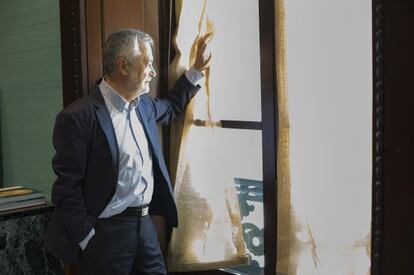Could the Andalusian premier be the next to fall in the ERE investigation?
Evidence suggests José Antonio Griñán may have known about embezzlement


Surprises continue to emerge from a police report that supports a Seville judge's accusations against 20 current and former Andalusian government officials in connection with a massive embezzlement case.
According to the report, the regional treasury commissioner, Carmen Martínez Aguayo, had first-hand knowledge of the irregular manner in which the government fund to help struggling businesses was being shared out among companies and individuals who were not eligible for the aid. The claim was made by Teresa Arrieta, the number two official at the Andalusian government's Intervención General, an internal audit body.
As much as 140 million euros from the fund may have been siphoned off between 2001 and 2010.
Whistleblower Arrieta is one of 14 Andalusian government workers to have testified in connection with the case. Their statements are the basis for Judge Mercedes Alaya's belief that the 20 officials she targeted this week were all aware that the system was deliberately designed to award the money in a discretionary manner that bypassed control systems, including that of the Intervención itself.
The ERE fund cost the Andalusian government 826 million euros
The Intervención issued 15 written alerts throughout that period of time, regarding the opaqueness of a fund that was set up to help restructuring businesses pay compensation to laid-off workers. However, the investigation has shown that hundreds of people - including family members of certain officials - illegally received money from the fund, including some who never worked at any of the companies that benefited from the aid. The so-called ERE fund cost the Andalusian government 826 million euros from 2001 to 2010.
The scandal, which has been the subject of an inquiry for over a year, has shaken the Andalusian Socialist Party, which has been in power in the southern region for the last three decades. So far, the highest-ranking official to be targeted in the ERE case is former Public Works Minister Magdalena Álvarez, who was the Andalusian treasury commissioner from 1994 to 2004. But many pundits believe that José Antonio Griñán, the current Andalusian premier, could be next.
Two years ago, Treasury Commissioner Martínez Aguayo admitted receiving the audit body's reports, but said he failed to inform Griñán, who was himself the treasury commissioner between 2004 and 2009, and was thus exonerated from blame.
In her statements to the Civil Guard in July of last year, Intervención official Teresa Arrieta stated that the only person who had the power to correct the deficiencies in the ERE payment mechanism was the treasury commissioner. Two months later, she nuanced her statements, saying that the commissioner could have had the procedure corrected "if it was considered convenient" but that it was not a legal obligation.
The testimony does not directly say that Griñán knew about the irregularities during his tenure as treasury commissioner, but it does note that he was the one who could have effected changes to the system.
Asked by journalists earlier this week whether he might be next, Griñán declined to comment. But some political analysts suggest that this possibility may explain Griñán's decision to abandon politics and call express primaries to find a quick replacement by the end of this month.
High-ranking Socialists, such as deputy secretary general Elena Valenciano, have implied there is a secret agenda behind Alaya's decisions, which she says coincide "with Swiss-watch-like precision" with major events within the Andalusian Socialist Party.
Tu suscripción se está usando en otro dispositivo
¿Quieres añadir otro usuario a tu suscripción?
Si continúas leyendo en este dispositivo, no se podrá leer en el otro.
FlechaTu suscripción se está usando en otro dispositivo y solo puedes acceder a EL PAÍS desde un dispositivo a la vez.
Si quieres compartir tu cuenta, cambia tu suscripción a la modalidad Premium, así podrás añadir otro usuario. Cada uno accederá con su propia cuenta de email, lo que os permitirá personalizar vuestra experiencia en EL PAÍS.
¿Tienes una suscripción de empresa? Accede aquí para contratar más cuentas.
En el caso de no saber quién está usando tu cuenta, te recomendamos cambiar tu contraseña aquí.
Si decides continuar compartiendo tu cuenta, este mensaje se mostrará en tu dispositivo y en el de la otra persona que está usando tu cuenta de forma indefinida, afectando a tu experiencia de lectura. Puedes consultar aquí los términos y condiciones de la suscripción digital.








































